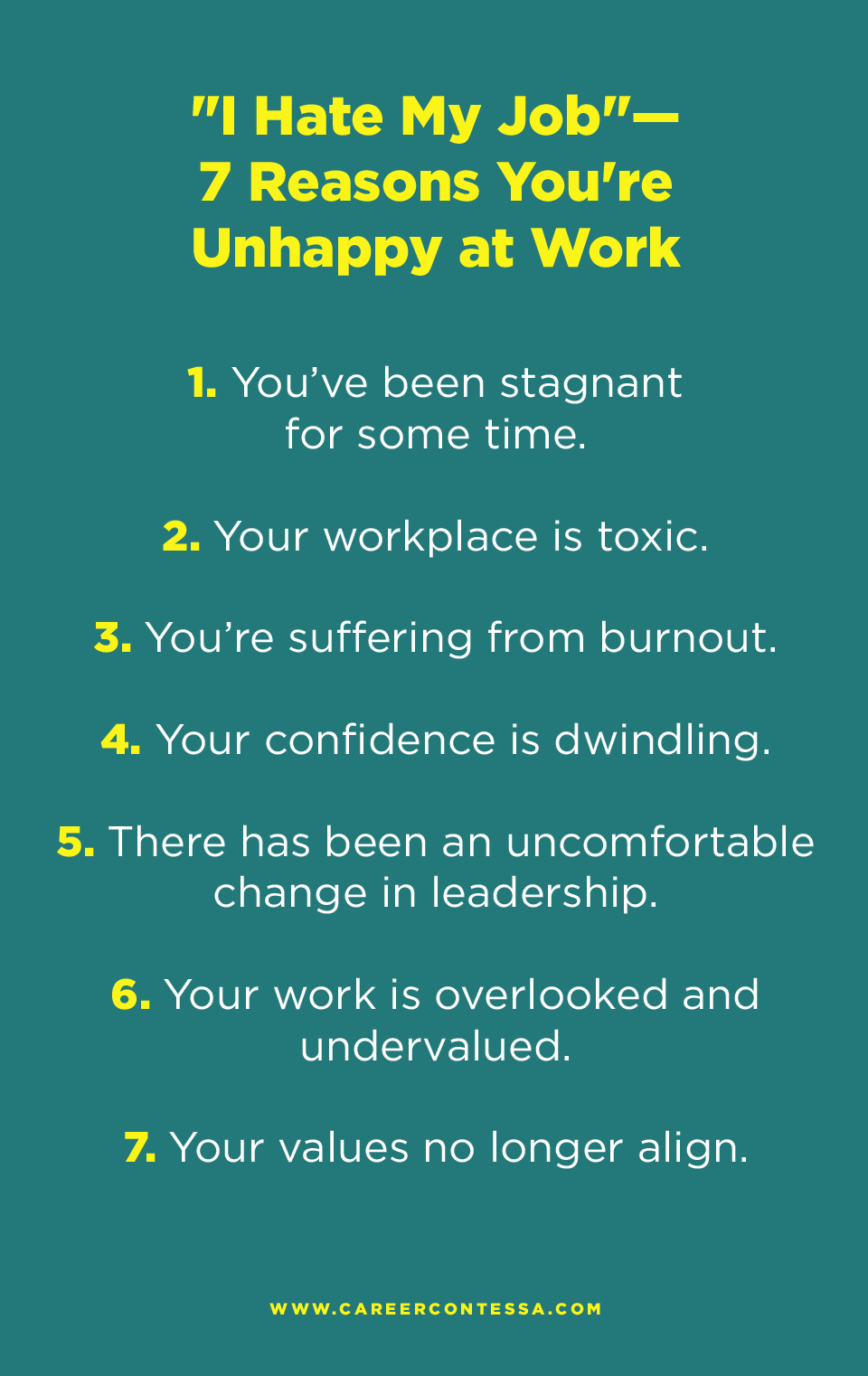Hey, did you just type “I hate my job” into a search engine?
When your job feels hopeless, deflating, and inescapable, it’s a horrible feeling. Like anything, jobs ebb and flow.
Every day cannot be perfect. Some weeks, months, or even entire quarters will be particularly challenging at times.
You likely know the difference between a “bad week” and an
overall toxic situation. You're not alone either. A
global Gallup poll found that a shocking
85 percent of the world's workforce is unhappy at work. It’s time to examine where you are in your current job, whether or not you can improve your work situation, or if you need to start the process of looking for
your next career opportunity.
But before
you rage quit your job and begin an arduous job search, let's explore why the job you may have once loved has now become a job you hate.
Table of Contents
The good news?
Sometimes, you can turn your job around. Other times, you might find that your job and your
workplace is too toxic and you need to look elsewhere.
You Hate Your Job Because It's Stagnant
You know when LinkedIn congratulates you on your
work anniversary? Have you ever received one of those notifications and responded, “I’ve been here that long?!”
Then, you're flooded with a thousand other thoughts about your career and your non-existent job satisfaction. How has that much time passed? What have I been doing over these past years?
This is when you realize that you're at a standstill—and you don't like it.
How it feels:
Stagnancy in a job can be tough to identify at first. It’s likely to feel like Groundhog Day: doing the same thing over and over and over. Before you know it, it’s been five years and you haven’t grown your skillset.
You’re stuck.
Why it’s happening:
There are a few reasons you might be feeling stagnant at your job. Let’s explore the toughest possibility first—it might be you.
If you find your job easy enough, you might just glide by.
When nobody is directly challenging you, when you have a fairly unchallenging quota to meet, or when your job is overly easy, you might be completely willing to go with the flow.
If you’ve reached out to leadership with new ideas and you’ve communicated your willingness to learn and grow only to be met with silence or empty promises, you may have reached a stagnancy plateau.
We’re going to talk more about
burnout later, but prolonged stagnancy can lead to a particular type of burnout—underchallenged burnout.
This is where you are bored day in and day out. It can lead to a lowered mood and even depression in the long-run.
What to do:
We think your career should always challenge and excite you—at least a little.
No matter your job title, there is always creativity to be found—in any “job” and in any “career.” If you find yourself punching in and robotically moving through your day before punching out, you’re stagnant.
Have you been itching to show off your design skills? Perhaps you can zhuzh up your net data analytics meeting.
You Hate Your Hostile or Toxic Work Environment
Toxic work environments breed unrest, competition, low morale, constant stressors, negativity, sickness, high turnover, and even bullying.
How it feels:
In a word, it feels horrible.
Here's the kicker. It takes very little for a workplace to become toxic. Once a company becomes toxic, it will infest every crevice of an organization.
Why it’s happening:
Some organizations are founded on greed or a “me-first-kill-or-be-killed” mentality and are toxic from day one. Other companies have good intentions that fall to the side in favor of money or power.
Sometimes, a workplace becomes toxic due to a single employee. It’s wild to behold, and it takes forever to clean up a mess like that.
Once it gets a hold of an organization, toxicity is relentless.
What to do:
Get out.
You’re Suffering from Workplace Burnout
There’s so much to do that you’re constantly in a dizzying haze. When was the last time you even had a moment to speak with your friends?
How it feels:
Burnout can feel three very specific ways, depending on the
type of burnout you’re experiencing. We are all likely pretty familiar with frenetic burnout.
Wornout burnout is the type of burnout experienced by employees who are constantly overworked without any positive outcomes or recognition.
Similarly, frenetic burnout is the burnout that employees who work in high-pressure environments feel over a long period of time.
Why it’s happening:
Burnout happens because your job is asking too much of you. Burnout happens because this cycle is continuous and
it starts to take from your personal life, your relationships, and, eventually, your overall well-being.
What to do:
If you enjoy the function of your job, when you generally like your boss, and when
you love your coworkers, burnout might be the culprit.
Is there a way to better balance your work life with the rest of your life? Can you work in a flexible schedule, cut your hours, or
ask your boss for more support?
You Hate That Your Job is Killing Your Confidence
When you first started at your job, your confidence was soaring. You killed
the interview process and you were ready to take your career to the next level.
Fast-forward three months, six months, or a full year and—all of a sudden—it feels like you have run out of confidence.
Do you just suck at your job? (Of course not!)
How it feels:
It feels bad. When your job is hurting your confidence, you might arrive to work always feeling like you’re in trouble. You might find that your
Sunday Scaries start at 3:00 p.m. on Saturday.
Why it’s happening:
See every other item on this list. Your confidence could be dwindling because your boss only gives you negative
feedback. Your confidence could be lacking because you’re
overworked and under-appreciated.
Your confidence might be taking a hit because your job is taking a time and energy loan against your personal life and
your emotional well-being.
What to do:
When your job is whittling at your well-being, you might be in a toxic workplace. If your coworkers are rude, your boss is dismissive, and you are given no direction, it can be easy to feel lost, hopeless, and stupid.
But, that’s not the case. Try
speaking with your leadership about what you can be doing better, how to keep communication open, and how you can collaborate most effectively. See how it feels to be straightforward about your needs while listening to theirs. Be open to constructive feedback.
Alternatively, your confidence might be taking a hit because you’re letting it. Yes, yep, affirmative, there she is:
impostor syndrome.For someone never invited to the party,
impostor syndrome surely intercepts every invitation.
If your confidence is lacking simply because you feel like you're completely surrounded by smart people, then you might actually be in the right place. No, really, you are here for a reason—because you’re smart and driven, too.
What else to do:
If your bad workplace has really taken a toll on your confidence,
build it back up. Talk to your family, your close friends, and your near and dear.
These are your
best cheerleaders—and they will help you to escape your confidence lapse by reminding you that your bad boss and your crappy colleagues just ain't it.
You Hate the New Management
This is our very generous way of saying something else, which is “
I hate my boss.”
Listen, it happens. All leaders are not created equally. Sometimes, you and your manager will have personalities that simply do not mesh.
Other times? Your boss might be a jerk, full-stop.
How it feels:
We’re using the word “hate” pretty liberally here, but we don’t mean to.
It’s just that, when you feel so frustrated with your boss, you probably are using that four-letter word (likely alongside some other choice four-letter words, as well). In short, “hating” your boss doesn’t feel good at all. You spend 40+ hours at work or working alongside your boss. If you are not aligned, it can be a serious stressor.
When you see your boss’s name hit your inbox, you roll your eyes, your heart rate quickens, and your palms start to sweat.
Why it’s happening:
This can be happening for a variety of reasons.
It’s possible that the two of you don’t work well together, that your boss
communicates poorly, or that your boss is disrespectful, abusive,
micromanaging, or inept.
What to do:
There are a few avenues you might take, depending on the situation.
If this is a relationship that can be salvaged, try suggesting a 1:1 with your manager.
Communicate your feelings of disconnect—and come up with solutions, too. This is called
managing up, wherein you do the legwork to improve your collaboration with your boss.
If your boss is abusive or engaging in seriously questionable practices, it might be time to take the situation to HR. If your bad boss is HR, it might be time to move on entirely.
Here are a few resources we have for dealing with a boss you hate.
Your Work Is Overlooked and Undervalued
Work can be busy.
Before you know it, another year has gone by and it feels like you’ve accomplished nothing—except you know that’s not true. In fact, you’ve accomplished so much.
The problem is that you’ve received no positive feedback, recognition, or opportunity for promotion.
How it feels:
Maybe you’re not the type of person who needs
positive feedback at every turn. However, when you receive none—or when you only ever receive negative feedback—it can start to drain your confidence reserve.
It’s a slow burn, but it exists.
This also happens when you’re constantly overworked, “given” new projects, and when you’re
being generally taken advantage of. This often happens to high-performing employees who can turn work over quickly, efficiently, and error-free.
Why it’s happening:
This is likely a leadership problem. It’s your manager’s job to manage their team—in good and bad. Your manager should be giving you
positive feedback and praise alongside constructive feedback.
This can also be a
cultural problem across the entire organization, which is way more damaging. This is common in high-pressure environments with “no time” for praise.
What to do:
You have to communicate your frustration in these circumstances. You might request an
annual review where you can realign your job responsibilities and your output.
It also might be time to
ask for a raise. If your job description aligns with a new position (with way more responsibilities), it’s time to ask for a promotion—both in your title and in compensation.
You Hate the Values at Your Workplace
This is common as we progress in our careers, but it can be hard to identify when we're in the moment.
Your values will shift over time—and your workplace may or may not be able to meet you where you are now—or in the near future.
How it feels:
As we said, this is a tougher one to identify, which is also why it’s also super deflating. When your values no longer align, the career you loved doesn’t feel familiar or “right” anymore.
Why it’s happening:
When you started your job, you loved it. It was your “
dream job” when you entered the building three years ago. However, things have changed. You’re not so much about the “work hard, play hard” feel anymore.
You don’t want to spend 80+ hours at the office or “with the team.”
What to do:
This is likely a company culture thing. As your career progresses in an organization whose values feel increasingly misaligned with your own, it might just…get worse.
For example, if you’re feeling that work-life balance is much more “work” focused at your organization, it will likely be even more so as you climb the ladder.
At this point, take time to make a list of
your own values and your goals. Next to that list, create a list of your organization’s values and demands.If there’s an opportunity to realign, then take the steps to do so.
If you find that your values have become completely misaligned, start looking for opportunities within organizations that fit your current values and future aspirations.
In Conclusion, A Few Reminders About Work
We have heard a few refrains in our time here at Career Contessa. Here are a few reminders to keep with you, especially when you're feeling dissatisfied with work.
- Getting a paycheck is not an exchange for your happiness.
- Mondays shouldn't always be awful (but some will always be, because, Mondays).
- Constant anxiety and stress regarding work will damage your overall health.
- It's not "normal" to dislike your boss (you should have leadership that inspires and helps you to grow!).
- Happiness at work is not a luxury. It's a right.
- Career change is always possible.
- Your next job is out there if you want it.













